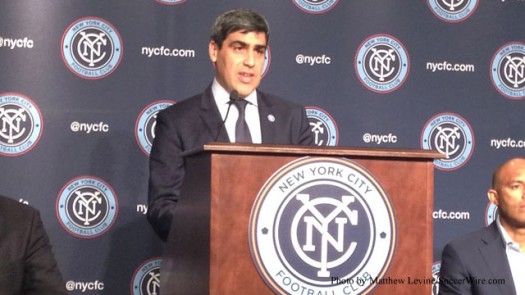Dure: Young players must learn to pass the dadgum ball
 The convention center was angry that day, my friends, like George Costanza’s girlfriend after he admitted he wasn’t a marine biologist.
The convention center was angry that day, my friends, like George Costanza’s girlfriend after he admitted he wasn’t a marine biologist.
Claudio Reyna was unveiling the new U.S. Soccer curriculum at the 2011 NSCAA convention, and he was warning about “over-dribbling.” Coaches muttered at the back of the room: “Over-dribbling? What is he talking about?”
 I bumped into Reyna later and mentioned the coaches’ grumbling. He gave me an exasperated look. You don’t see Barcelona and other elite teams hogging the ball, he said. They keep it moving from player to player.
I bumped into Reyna later and mentioned the coaches’ grumbling. He gave me an exasperated look. You don’t see Barcelona and other elite teams hogging the ball, he said. They keep it moving from player to player.
+READ: Dure: Youth soccer’s vanishing middle class
And the curriculum itself says “Speed of play, avoiding over-dribbling, looking for an organized and quick movement of the ball and finishing will be encouraged in all age groups.”
It’s hard to tell where that curriculum stands now that Jurgen Klinsmann has been given a mandate to overhaul everything in U.S. soccer and develop a national style based on … um … he’ll surely tell us at some point, won’t he?
But great coaching minds still disagree on “over-dribbling.” Some even insist young players — U-7, U-8, even U-10 — aren’t really playing a team sport. They lament the American mindset of calling creative dribblers “ball hogs.”
I am not a great coaching mind, but I have watched, played and coached a lot of excruciatingly bad soccer. And I have one suggestion for improving it, at all ages:
Pass the dadgum ball.
Reyna’s right — for all of Lionel Messi‘s and Andres Iniesta’s marvelous dribbling skill, where would they (and the rest of Barcelona) be if they hadn’t learned how to move the ball around? The world’s best teams pass the dadgum ball.
+READ: Dure: Brainstorming a coaching curriculum for parent coaches
And it’s absolutely essential at early ages. How are you going to develop a first touch if you’re not receiving passes? You won’t. Pass the dadgum ball.
 The no-pass game also tilts the youth soccer scales from the skilled player to the athletic player. The big, fast dude who can get the ball out of the mob has the edge. The small player who can make a couple of moves and then distribute will never see the ball. You know how you can get her involved? Pass the dadgum ball.
The no-pass game also tilts the youth soccer scales from the skilled player to the athletic player. The big, fast dude who can get the ball out of the mob has the edge. The small player who can make a couple of moves and then distribute will never see the ball. You know how you can get her involved? Pass the dadgum ball.
I’ve seen recreational and developmental players quit the game in frustration because they get sick of working hard to get open without their teammates getting them the ball. Want to keep them playing? Pass the dadgum ball.
Yes, Diego Maradona scored a fantastic World Cup goal against England (not the divine handball) by slaloming through the entire English team:
Such goals are rare for a reason. Want to know what else he could do? Pass the dadgum ball.
When players are on their own, they should absolutely practice dribbling, juggling and the moves that will help them elude defenders. They should get as many touches on the ball as they possibly can. At practice, when you have an opportunity to work with others? Pass the dadgum ball.
Want more for your players to work on at home? Try Yael Averbuch’s video series of fun drills players can do on their own. They’ll get plenty of touches, and they’ll be comfortable on the ball. You know what else they’ll learn from her drills against a wall? They’ll learn to receive when other players pass the dadgum ball.
I’m not suggesting coaches should teach passing at the exclusion of everything else. That would be an overcorrection — just as it was an overcorrection several years ago when coaches felt we were drumming the creativity out of kids by yelling “Pass!” every time they took a touch or two. We still want to encourage 1v1 play. Then we need to teach players what to do when they beat that 1 and see three defenders coming at them. One hint: Pass the dadgum ball.
You have to strike a balance. Soccer, at least above the age of 6, is never just one thing. If you want to learn one thing, take up the javelin. Soccer is about dribbling, defense, running and shooting.
And one more thing:
Passing the dadgum ball.











